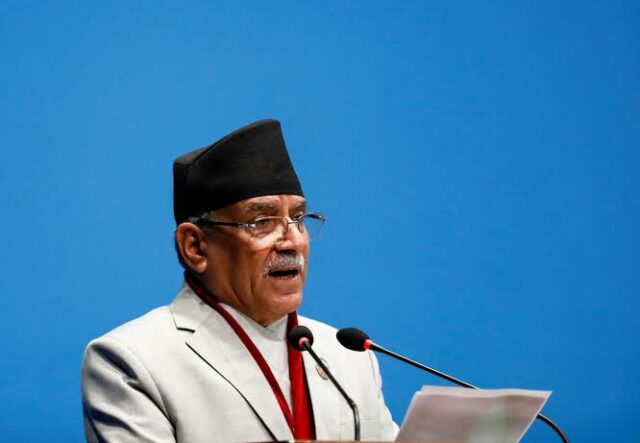KATHMANDU: Politics is the art of the possible. In Nepal, Kedar Karki a rebel candidate of the ruling Nepali Congress (NC) was elected chief minister of eastern Koshi province last month with the backing of opposition party lawmakers, stunning the official candidate Indra Bahadur Angbo of the Maoist Centre. Supporting the rebel was Shekhar Koirala, a leading member of the NC and nephew of the country’s first elected prime minister the late B.P. Koirala. He also had the support of the opposition CPN-UML, and eight lawmakers from his own party who had earlier favoured Angbo, also of the Maoist Centre.
“It was an obvious setback for the ruling coalition but we resolved the issue after deciding to join the government led by Karki,” Haribol Gajurel, chief political advisor to Prime Minister Pushpa Kamal Dahal, said. “Even though this is a bitter experience, it will not affect the stability of the current government and ruling alliance.”
But facts tell otherwise: in the Koshi assembly the ruling alliance has just one more seat than the opposition, CPN-UML and Rastriya Prajatantra Party. The ruling alliance has 47 seats in the 93-strong provincial assembly while the CPN-UML is the largest party in the assembly with 40 seats. Gajurel accused the CPN-UML of playing a ‘dirty game’, seeking to break the ruling coalition by trying to bring over the Koirala faction of the NC into its fold. Nevertheless, it seems the coalition will continue.
Prime Minister Pushp Kumar Dahal said, “Kedar Karki is the chief minister for all of us. Differences in politics are common. This [episode] hasn’t caused any damage to the coalition.”
“Now, there is an understanding in the ruling alliance that this episode won’t affect the unity of coalition partners in other areas,” echoed Ghanashyam Bhusal, general secretary of the CPN (Unified Socialist), another coalition member.
But the episode exposed how the internal political dynamics in the ruling alliance could affect the future of the coalition. Sources said the current alliance was formed after Dahal, Deuba and Nepal struck a power sharing agreement, each would have the prime minister’s chair until the next parliamentary elections in 2027. But details of this agreement have never been made public. Bhusal claims Dahal would lead the government for two years while Deuba and Nepal would follow, each having a tenure of one and a half years as prime minster.
But the Karki-Angbo affair has exposed the maneuvers of a section of the NC that wants a change in leadership and is reportedly talking to the UML, which resulted in the latter backing Karki for the Koshi chief ministership. This faction is also against the electoral alliance with the Maoist Centre.
“Our camp is in favour of changing the leadership of the government as it has failed to deliver on economy and governance,” Govinda Raj Pokharel, a central working committee member of the NC, having close ties with Koirala, said. “We cannot let such a situation continue. The NC should be entrusted to lead the new government, which is also the largest party, as it would be capable of garnering international support to strengthen the economy in the time of current crisis.”
His remarks reflected the October World Bank report which detailed the country’s economic growth, 1.9 percent in the last fiscal year with growth projected to improve to 3.9 percent, well below government’s forecast of six percent.
“Our priority is that the current coalition should continue with the NC leading the government,” said Pokharel. “But we also don’t rule out the option of changing the coalition itself. We are still at a disadvantage in terms of numerical strength but our position is strengthening within the party.”
But as long as the top leaders of the current coalition trust each and remain committed to honouring their power sharing deal, there is little possibility of change in the government leadership, ruling party leaders and political observers said.
“Our party will run the government for two years and hand over the premiership to other coalition partners,” said Gajurel, who is also senior leader of the ruling Maoist Centre. “Our party is committed to honour this understanding and we expect other parties will also stick to the understanding.”
After Dahal gives up the premiership, it will be the turn of Madhav Nepal, and Bhusal believes Dahal will honour the understanding among the coalition partners. Narayan Khadka, another central working committee member of NC also does not see any immediate chance of the current coalition breaking up. “In fact, there has been no discussion about changing the government or coalition within our party,” Khadka, who is close to Deuba, said. “In a democratic party like the NC, the leaders are open to express their individual opinions but nobody has submitted proposals for discussions in the party’s meeting to change the government leadership or coalition.”
In his view, “The faction (Koirala) does not have enough strength in the party to change its current position regarding the coalition.”
But taking the rival faction into confidence has emerged is a challenge for Deuba.
Likewise, emerging challenges from royalist groups that are still political minnows, but are gaining ground due to widespread frustration with the traditional political parties.
“From the perspective of pure numbers, I don’t see any near-term collapse of the current ruling coalition,” Hari Roka, a former lawmaker and political commentator said, “But I don’t rule out a new scenario where ruling and opposition parties, which are agents of current political change, come together to face the mounting challenges from conservative royalist forces.”
The author is a senior journalist with The Kathmandu Post





